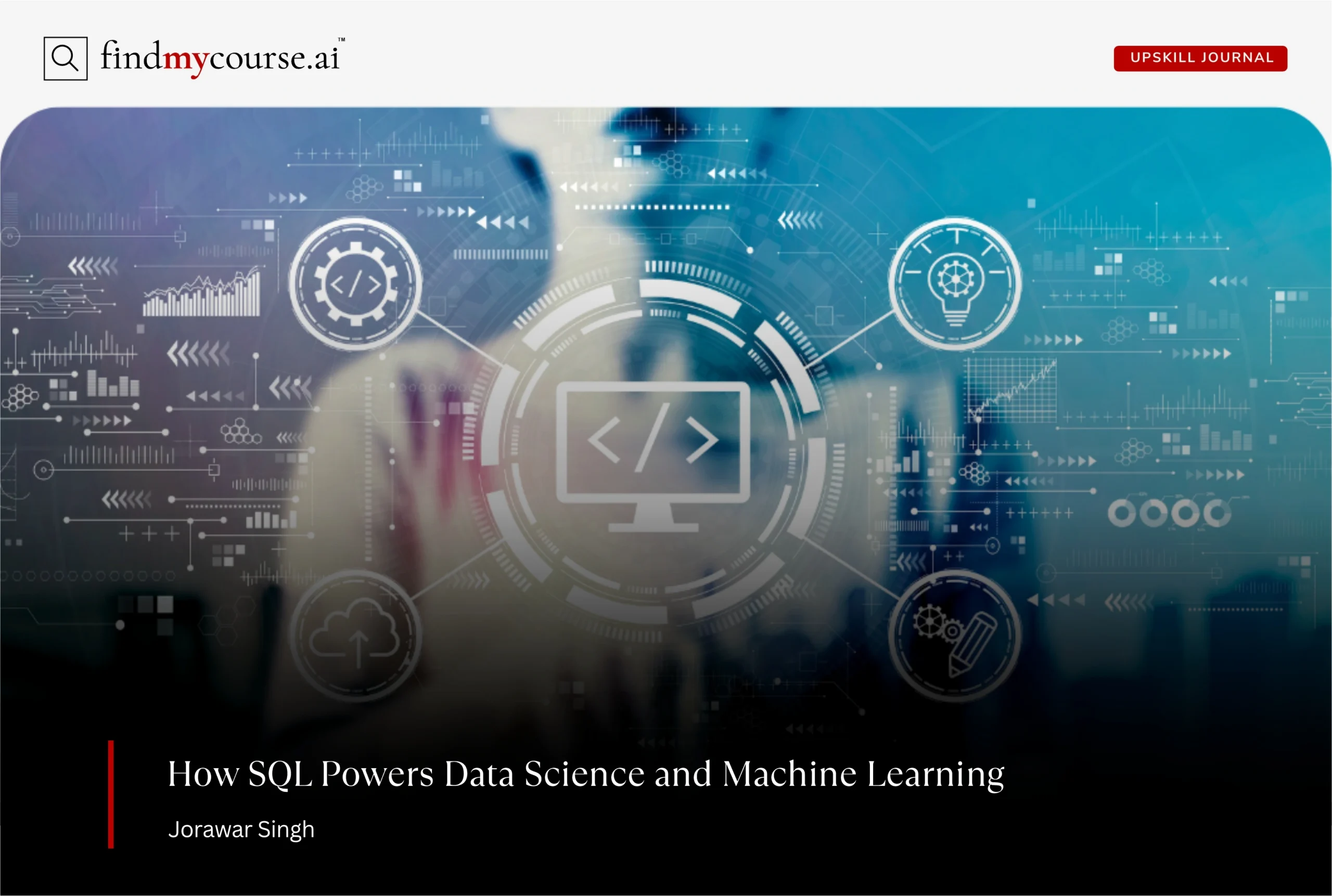In today’s data-driven world, making sense of massive amounts of information is essential for businesses, researchers, and organizations alike. This is where SQL in Data Science plays a crucial role. By providing a structured way to store, retrieve, and analyze data, SQL helps data professionals turn raw information into actionable insights. Whether you are managing customer data, research datasets or just looking to advance your skills through online learning, SQL forms the foundation for accessing the data that drives modern analytics.
What Is SQL?
SQL, or Structured Query Language, is a programming language specifically designed to interact with relational databases. In simple terms, it allows data scientists to store, retrieve, update, and organize data in a structured way. Its simplicity, flexibility, and speed make it a go-to tool for professionals who work with large datasets daily. Platforms such as MySQL provide practical environments for applying SQL skills to real-world datasets.
Main Roles of SQL in Data Science
Understanding the various roles of SQL in data science helps highlight why it remains an essential skill for professionals. From accessing raw data to preparing it for advanced analysis, SQL forms the foundation of every data-driven workflow.
1. Efficient Data Retrieval
Data scientists often work with massive amounts of information stored in relational databases. SQL allows them to retrieve exactly what they need quickly and efficiently. Using commands like SELECT, JOIN, and GROUP BY, they can extract specific insights from complex datasets. This capability saves time, reduces errors, and makes analysis more precise. Consequently, SQL becomes the backbone for data-driven decision-making in businesses across industries.
2. Data Cleaning and Preparation
Raw data is rarely perfect. Before analysis, it often needs cleaning and restructuring. SQL provides powerful tools to filter, update, and remove unwanted data, ensuring datasets are accurate and reliable. Tools like pandas in Python or dplyr in R can integrate with SQL to streamline data cleaning and transformation. Additionally, combining information from multiple tables into one organized structure ensures that any subsequent analysis or modeling is accurate.
3. Integration with Analytical Tools
Modern data workflows often involve multiple tools. SQL integrates easily with programming languages like Python and R, as well as with visualization tools such as Tableau . For Python, libraries like SQLAlchemy allow data scientists to query SQL databases directly and manipulate the results seamlessly.
For instance, a data scientist can use SQL to extract the necessary data, then switch to Python for advanced statistical analysis or machine learning. This integration ensures a smooth workflow, letting professionals leverage the strengths of multiple technologies effectively.
4. Handling Large Datasets
As data grows exponentially, managing large datasets efficiently becomes critical. SQL databases are optimized for large-scale storage, indexing, and query execution, allowing even millions of records to be analyzed without slowing performance. Platforms like PostgreSQL and cloud solutions such as Amazon Redshift or Google BigQuery make working with big data practical and effective. Mastering SQL is essential for handling large-scale, data-driven projects.
SQL in Machine Learning Workflows
In machine learning, pre-processing data is a fundamental step. SQL plays a key role in ensuring that the data fed into models is clean, accurate, and consistent.
- Data Extraction & Cleaning: SQL allows data scientists to retrieve relevant datasets, remove duplicates, and filter out unwanted records efficiently.
- Data Transformation: Operations like aggregating, joining, and restructuring tables prepare the data for machine learning algorithms.
- Integration with ML Tools: SQL works seamlessly with Python libraries (pandas, SQLAlchemy) and R packages (DBI) to streamline preprocessing before model training.
- Model Readiness: Clean and structured data from SQL ensures accurate training, evaluation, and prediction, bridging raw data and actionable insights.
Real-World Applications of SQL in Data Science
SQL’s versatility makes it invaluable across a wide range of industries, where data-driven decisions are key to success. Here are some notable examples:
- Business Analytics: SQL enables analysts to track sales trends, monitor customer behavior, and generate actionable insights that guide strategic planning. By efficiently querying large datasets, businesses can make informed decisions that drive growth.
- Healthcare Analytics: Hospitals and healthcare organizations rely on SQL to manage patient records, track treatment outcomes, and optimize resource allocation. Accurate data analysis ensures better patient care and more effective operational management.
- Financial Services: Banks and financial institutions use SQL to detect fraudulent transactions, monitor account activities, and develop predictive risk models. SQL’s ability to handle large volumes of transactional data makes it essential for financial security and planning.
- E-Commerce: Online retailers leverage SQL to analyze customer behavior, manage inventory, and improve personalized recommendations. Additionally, by transforming raw data into meaningful insights, companies can enhance customer experiences and increase revenue.
- Artificial Intelligence (AI) & Machine Learning: SQL helps prepare and structure massive datasets that train AI models. Data scientists use SQL to clean, filter, and join data from multiple sources, ensuring high-quality input for accurate model predictions.
- Internet of Things (IoT): Connected devices generate huge amounts of data every second. SQL allows organizations to store, query, and analyze IoT data efficiently, enabling smarter operations, predictive maintenance, and real-time monitoring.
- Social Media Analytics: Marketers and researchers use SQL to analyze trends, engagement metrics, and user behavior across social media platforms. This insight informs campaigns, enhances audience targeting, and drives brand growth.
In each of these scenarios, SQL does more than just store data—it provides the structure, efficiency, and reliability needed to turn raw information into actionable insights. Its influence extends beyond operational tasks, directly shaping strategic decisions and driving measurable outcomes.
The Future of SQL in Data Science
As data continues to grow in volume, variety, and velocity, the role of SQL in data science is expected to remain strong, evolving alongside new technologies. Moreover, professionals who master SQL are well-positioned to navigate the data-driven landscape of 2026 and beyond.
Key trends shaping SQL’s future include:
- Cloud Integration: SQL is increasingly integrated with cloud-based databases and platforms, allowing scalable storage and faster querying for distributed datasets.
- Big Data Compatibility: Modern SQL engines can handle massive datasets from platforms like Hadoop and Spark, ensuring performance even with enormous volumes of data.
- Advanced Analytics Support: SQL works seamlessly with AI and machine learning pipelines, enabling data preprocessing, aggregation, and transformation before model training.
- Automation and Optimization: Future SQL tools will offer smarter query optimization, automated indexing, and predictive data management to improve efficiency and reduce manual effort.
- Cross-Platform Integration: SQL continues to integrate with programming languages, visualization tools, and business intelligence platforms, allowing more flexible and comprehensive data workflows.
In short, SQL is not just a tool of the past—it is evolving to meet the future.
Final Thoughts
In summary, SQL plays a vital role in data science by helping professionals access, clean, and analyze data efficiently. From everyday business decisions to advanced AI projects, SQL provides the foundation for turning data into meaningful insights. Moreover, its adaptability ensures it will remain essential as technology continues to evolve. For anyone looking to thrive in data-driven fields, mastering SQL is a step toward smarter decisions and better results. And remember, if you need quick guidance or answers while learning, just ask our AI assistant—it’s here to help whenever you need it.


